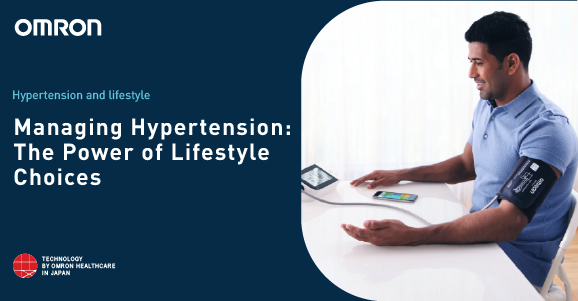Managing Hypertension: The Power of Lifestyle Choices
June 24, 2024 2024-09-16 10:32Managing Hypertension: The Power of Lifestyle Choices

Managing Hypertension: The Power of Lifestyle Choices
High blood pressure, or hypertension, is a widespread medical issue that affects millions of people globally. It’s a quiet but deadly condition that frequently goes undiagnosed until it causes more serious health issues like renal failure, heart disease, or stroke. A healthy lifestyle and knowledge of hypertension can greatly reduce its risks and enhance general health.
What is Hypertension?
The force that blood exerts on the walls of the body’s primary blood vessels, or arteries, is known as blood pressure. When this force is always too high, hypertension develops. Two numbers represent blood pressure readings: the diastolic (the pressure in between beats) and systolic (the pressure during a pulse). A value of about 120/80 mm Hg is typical.
Causes and Risk Factors
A person’s age, lifestyle choices, and genetics can all contribute to hypertension. Many risk factors are adjustable, but some, like age and family history, are uncontrollable. A poor diet, smoking, being overweight, being sedentary, and drinking too much alcohol are all major causes of hypertension.
The Importance of Lifestyle in Managing Hypertension
An important factor in controlling and preventing hypertension is lifestyle. The following significant lifestyle adjustments can lower blood pressure:
- A Healthy Diet
A healthy diet is essential for controlling high blood pressure. It is strongly advised to follow the Dietary Approaches to Stop Hypertension (DASH) diet. This diet lowers intake of salt, cholesterol, and saturated fats while increasing consumption of fruits, vegetables, whole grains, lean meats, and low-fat dairy products. Foods high in calcium, magnesium, and potassium are very helpful in reducing blood pressure.
- Regular Exercise
Regular exercise fortifies the heart and makes it more efficient at pumping blood, which reduces the strain on the arteries. Try to get in at least 150 minutes a week of moderate-intensity aerobic activity, such as swimming, cycling, or brisk walking. Strength training exercises are also advantageous and must be included at least twice a week.
- Managing a Healthy Weight
Excess weight increases the strain on the heart and can lead to hypertension. Losing even a small amount of weight can significantly reduce blood pressure. A combination of a healthy diet and regular physical activity is the most effective way to achieve and maintain a healthy weight.
- Limiting Alcohol and Avoiding Tobacco
Drinking too much alcohol can increase blood pressure and cause weight gain. In addition to momentarily raising blood pressure, smoking destroys blood vessel walls, hastening the hardening of the arteries. Giving up smoking and limiting alcohol is essential for controlling hypertension and enhancing cardiovascular health in general.
- Stress Management
Prolonged stress can lead to detrimental habits like excessive food intake, inadequate sleep, and drug usage, all of which can exacerbate hypertension. Normal blood pressure may be maintained by using stress-reduction practices like yoga, deep breathing exercises, meditation, and enough sleep.
Monitoring and Medical Management
It is essential to regularly check blood pressure, particularly in those with a history of hypertension or other risk factors. Widely accessible home blood pressure monitors can assist people in keeping tabs on their blood pressure in between doctor visits. For some people, a doctor’s prescription for medication is required since lifestyle modifications alone might not be enough. The greatest method for efficiently treating hypertension is to follow recommended drug regimens in addition to making lifestyle modifications.
Conclusion
One may control hypertension, which is mostly determined by lifestyle decisions. The key to treating high blood pressure is to adopt a good diet, exercise frequently, keep a healthy weight, consume less alcohol, abstain from tobacco, and learn stress management techniques. Active lifestyle modifications can dramatically lower the risks of hypertension and contribute to a longer, healthier life when combined with routine monitoring and medical guidance. The key to managing hypertension is arming oneself with knowledge and adopting wise lifestyle decisions. It’s never too late to start making healthy choices that will improve your heart and general health in the long run.






